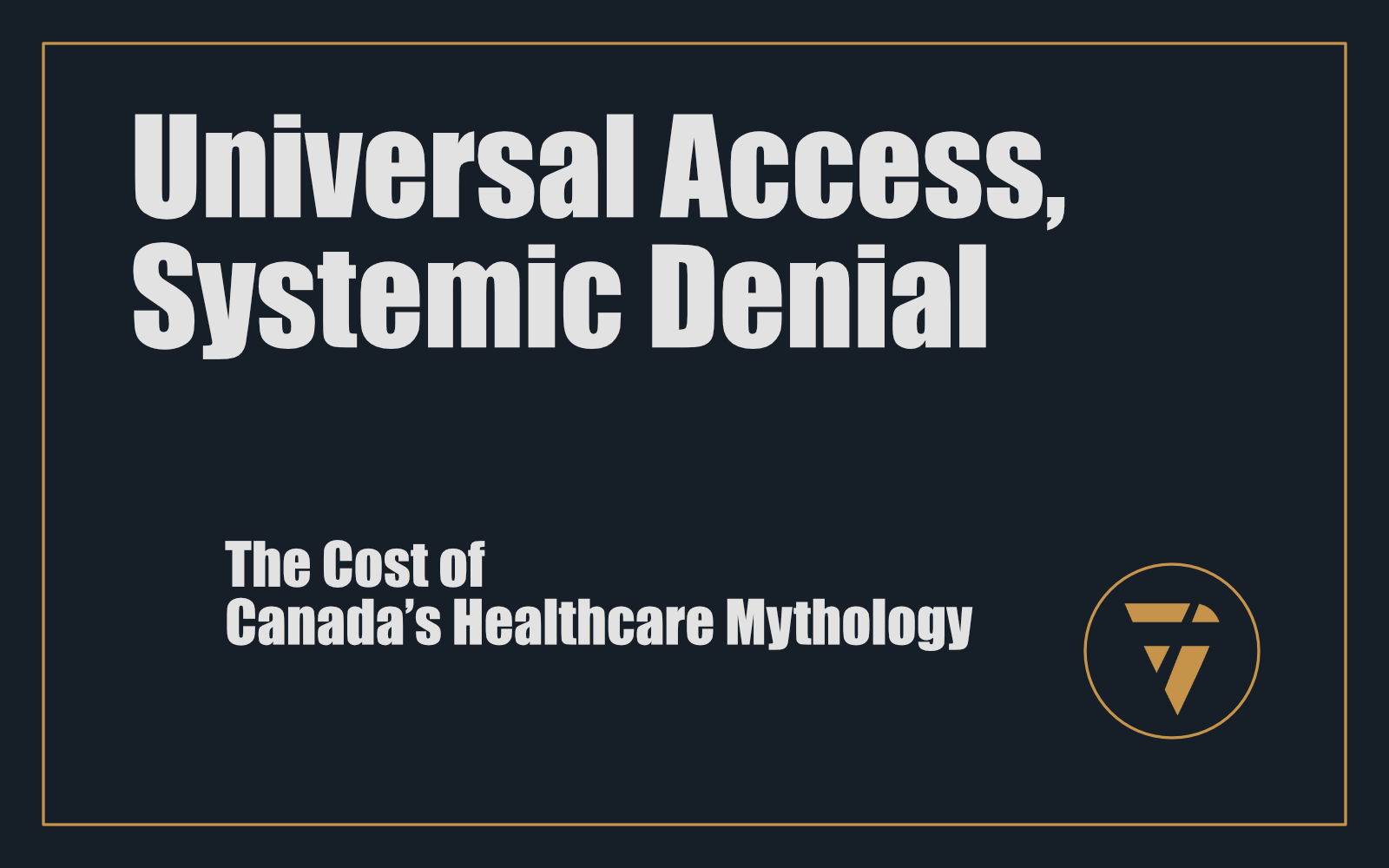Universal Access, Systemic Denial

The Cost of Canada’s Healthcare Mythology
The entire structure of modern healthcare bows to the myth of the “clinical entrepreneur.” That a good doctor — through grit, grades, and gumption — is somehow also a capable business operator. It’s a lie that’s cost us billions, burned out thousands, and left patients waiting in silent corridors.
Here’s the real breakdown:
Situation: Doctors are trained to diagnose and treat, not to build systems, manage cash flow, recruit staff, or negotiate real estate. Yet the system hinges on private practice models where they’re expected to do all of this, just to earn the right to see patients.
Problem: When your revenue model requires the doctor to also be the CEO, you fracture their energy. The very people we need focused, alert, and present are instead fighting with payroll, landlords, and EHR software. Most aren’t taught to lead. And the ones who try are doing it on fumes.
Solution: Rip the responsibility of business infrastructure out of clinical hands. Build shared operating platforms. Professionalise the backend. Let doctors be doctors. Structure them as strategic resources inside a system designed to amplify their impact, not dilute it.
Consequence: Until we do this, we will keep losing our best clinicians to burnout, bureaucracy, and broken economics. And the patients — the very reason this system exists — will keep paying for it in longer waits, rushed visits, and missed diagnoses.
Audit your local healthcare delivery model. Who actually holds the financial risk? Who owns the operating systems? Where does the doctor sit, at the centre, or buried under admin? That answer will show you where the fracture lives.
I. THE FRACTURE WE BUILT INTO THE FOUNDATION
In Canada, we tell ourselves a comforting story.
That we are not like them.
That unlike the Americans, we do not sell care to the highest bidder. That we do not leave the sick behind. That our system — public, universal, humane — is a beacon of equity.
That story is a myth.
Because while our values are different, our structure is broken, built on the same false premise:
That healthcare can function without clarity of role. That doctors can run businesses and deliver care. That a bureaucratic apparatus can manage a clinical system without collapsing under its own contradictions.
In truth, we built a system that hides its failures behind long wait times, masked accountability, and professional exhaustion. One that sacrifices care on the altar of administration. And one that survives not through excellence, but inertia.
We didn’t commercialise care like the Americans.
We corporatised it through confusion.
And now the collapse is accelerating.
II. THE MYTH OF THE MORAL MODEL
Canada’s healthcare system was never designed for performance. It was designed for access.
The core of Medicare wasn’t excellence, it was equity. A promise that no one would be denied care because of income, geography, or status.
That promise mattered. It still does.
But somewhere along the way, we mistook access for outcome.
We told ourselves that coverage was the same as care. That seeing a doctor eventually meant the system worked. That as long as no one had to swipe a credit card, we had nothing to fix.
But waitlists grew. Rural services vanished. Family physicians closed their doors. And behind the scenes, a more dangerous pattern emerged:
Every structural problem was handed to clinicians to solve.
Doctors were told to be operators.
Nurses were told to be crisis managers.
Hospitals were told to absorb every failing of every other system — social housing, mental health, elder care — and make it work with the same budget, fewer staff, and more reporting requirements.
What we built was a contradiction. A state-run health ecosystem that functions like a decentralised small business sector — where the owners are clinicians, but the rules are bureaucratic.
No training. No control. All responsibility.
It’s a slow-motion disaster. Polite. Civil. Deadly.
III. THE OPERATING SYSTEM OF CARE VS. THE MACHINERY OF GOVERNANCE
Understand this clearly:
Medicine is not governance.
Clinicians are not policy instruments.
Healthcare, true healthcare, is built on time, trust, judgment, and presence. It’s the art of sitting with uncertainty and intervening with clarity. It is inherently human. It resists industrialisation.
But governance, the machinery we built around it, is built for standardisation. It thrives on audit trails, compliance metrics, and political risk aversion. It is designed to cover liability, not to deliver care.
And in Canada, we confused the two.
We turned hospitals into ministries. Clinics into cost centres. Doctors into data-entry clerks.
We didn't privatise care, we bureaucratised it into paralysis.
And now, even the most committed clinicians are walking away. Not because they stopped caring. But because the system stopped letting them care.
IV. THE LIE THAT DOCTORS ARE BUSINESS OPERATORS
This is the core fracture.
In Canada, we expect doctors to run businesses — manage leases, payroll, operations, staffing, compliance — while also practising medicine, educating patients, absorbing the overflow of every other failing system, and hitting performance metrics designed by people who’ve never seen a patient bleed.
It’s madness.
Imagine asking firefighters to manage the city’s plumbing. Or teachers to manage the entire school’s budget, cafeteria, and custodial staff.
Now picture what happens when we do that to doctors. Year after year. With no training. No support. No relief.
That’s where we are.
The family practice model is collapsing. Emergency departments are overwhelmed not by emergencies, but by absence, the absence of capacity elsewhere.
And governments respond by blaming “inefficiency,” “retirements,” and “demand.”
Not structure.
Never structure.
Because if we admitted the truth, that we built a healthcare system on a managerial fantasy, we’d have to rebuild it from the root.
V. THE TRUTH WE MUST TELL
Here’s what no politician will say:
- Healthcare is not expensive because people are sick. It’s expensive because the system is incoherent.
- The problem is not a lack of funding, it’s a lack of structural integrity.
- You cannot run a system where the operators have no power, the funders have no insight, and the patients have no access... and call that “universal care.”
- You cannot ask clinicians to operate like business owners without giving them the authority, tools, or training to do so.
It is not heroic to stay in this system.
It's masochistic.
And we’ve made masochism mandatory.
VI. WHAT A CANADIAN SYSTEM BUILT FOR CARE COULD LOOK LIKE
We need to stop looking south.
This is not about markets. It’s about roles.
Rebuild the spine of the system by reassigning responsibility:
- Government: Fund. Regulate. Set standards. But stop micromanaging operations.
- Clinicians: Practice medicine, not run leases, HR, and scheduling.
- Operators: Professionalise the management layer. Let clinics and hospitals be run by expert administrators with aligned incentives and clinical literacy.
- Technology: Build tools that serve the clinician, not the bureaucrat. Stop designing for billing. Start designing for clarity and care.
Structure clinics like utilities: reliable, local, coordinated.
Fund primary care teams, not individual fee-for-service codes.
Replace competition with coordination.
Measure what matters: continuity, outcomes, trust.
Decentralise the paperwork. Centralise the intelligence.
You want cost control? Build for coherence.
You want access? Stop bleeding clinicians.
You want health? Then stop pretending this is a game of volume.
VII. CLOSURE: CHOOSE CARE OR CHARADE
We are at the brink.
Not because our values are broken, but because we’ve buried those values beneath 40 years of drift, delusion, and downloaded responsibility.
The Canadian model is not evil.
It's exhausted.
And exhaustion breeds collapse.
If we don’t redraw the lines — if we keep pretending doctors are operators, nurses are infinite, and patients are manageable — we will lose the very thing we claim to protect: universal, equitable, humane care.
Canada can build the best healthcare system in the world.
But only if we start by tearing down the lie at its core.
Medicine is not a business.
And pretending otherwise is killing the people who still believe it matters.
This is what I’m working on. Tell me what you think, I enjoy the conversation! Subscribe and follow the work in real time.
Thanks!
B

Canada didn’t privatise care. It buried it in bureaucracy. Doctors aren’t burning out, they’re bleeding out under a system that pretends coverage is care.
PS -






